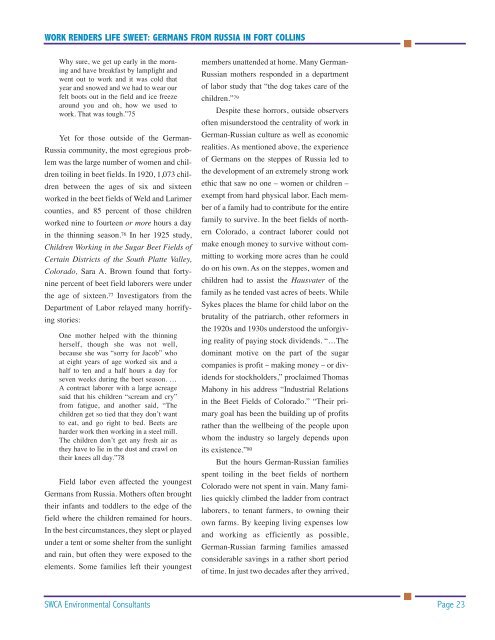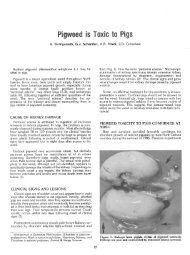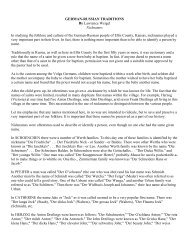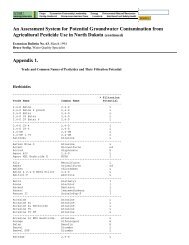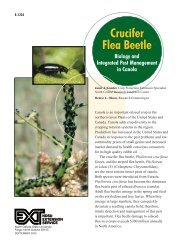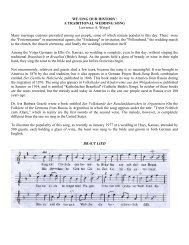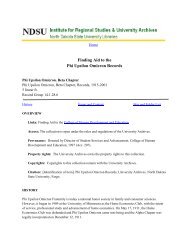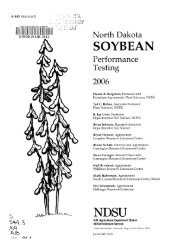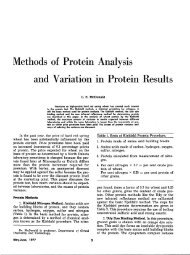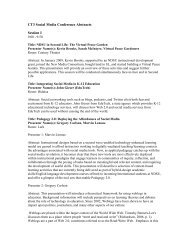germans from russia in fort collins, 1900-2000 - Libraries
germans from russia in fort collins, 1900-2000 - Libraries
germans from russia in fort collins, 1900-2000 - Libraries
You also want an ePaper? Increase the reach of your titles
YUMPU automatically turns print PDFs into web optimized ePapers that Google loves.
WORK RENDERS LIFE SWEET: GERMANS FROM RUSSIA IN FORT COLLINS<br />
Why sure, we get up early <strong>in</strong> the morn<strong>in</strong>g<br />
and have breakfast by lamplight and<br />
went out to work and it was cold that<br />
year and snowed and we had to wear our<br />
felt boots out <strong>in</strong> the field and ice freeze<br />
around you and oh, how we used to<br />
work. That was tough.”75<br />
Yet for those outside of the German-<br />
Russia community, the most egregious problem<br />
was the large number of women and children<br />
toil<strong>in</strong>g <strong>in</strong> beet fields. In 1920, 1,073 children<br />
between the ages of six and sixteen<br />
worked <strong>in</strong> the beet fields of Weld and Larimer<br />
counties, and 85 percent of those children<br />
worked n<strong>in</strong>e to fourteen or more hours a day<br />
<strong>in</strong> the th<strong>in</strong>n<strong>in</strong>g season. 76 In her 1925 study,<br />
Children Work<strong>in</strong>g <strong>in</strong> the Sugar Beet Fields of<br />
Certa<strong>in</strong> Districts of the South Platte Valley,<br />
Colorado, Sara A. Brown found that <strong>fort</strong>yn<strong>in</strong>e<br />
percent of beet field laborers were under<br />
the age of sixteen. 77 Investigators <strong>from</strong> the<br />
Department of Labor relayed many horrify<strong>in</strong>g<br />
stories:<br />
One mother helped with the th<strong>in</strong>n<strong>in</strong>g<br />
herself, though she was not well,<br />
because she was “sorry for Jacob” who<br />
at eight years of age worked six and a<br />
half to ten and a half hours a day for<br />
seven weeks dur<strong>in</strong>g the beet season. …<br />
A contract laborer with a large acreage<br />
said that his children “scream and cry”<br />
<strong>from</strong> fatigue, and another said, “The<br />
children get so tied that they don’t want<br />
to eat, and go right to bed. Beets are<br />
harder work then work<strong>in</strong>g <strong>in</strong> a steel mill.<br />
The children don’t get any fresh air as<br />
they have to lie <strong>in</strong> the dust and crawl on<br />
their knees all day.”78<br />
Field labor even affected the youngest<br />
Germans <strong>from</strong> Russia. Mothers often brought<br />
their <strong>in</strong>fants and toddlers to the edge of the<br />
field where the children rema<strong>in</strong>ed for hours.<br />
In the best circumstances, they slept or played<br />
under a tent or some shelter <strong>from</strong> the sunlight<br />
and ra<strong>in</strong>, but often they were exposed to the<br />
elements. Some families left their youngest<br />
members unattended at home. Many German-<br />
Russian mothers responded <strong>in</strong> a department<br />
of labor study that “the dog takes care of the<br />
children.” 79<br />
Despite these horrors, outside observers<br />
often misunderstood the centrality of work <strong>in</strong><br />
German-Russian culture as well as economic<br />
realities. As mentioned above, the experience<br />
of Germans on the steppes of Russia led to<br />
the development of an extremely strong work<br />
ethic that saw no one – women or children –<br />
exempt <strong>from</strong> hard physical labor. Each member<br />
of a family had to contribute for the entire<br />
family to survive. In the beet fields of northern<br />
Colorado, a contract laborer could not<br />
make enough money to survive without committ<strong>in</strong>g<br />
to work<strong>in</strong>g more acres than he could<br />
do on his own. As on the steppes, women and<br />
children had to assist the Hausvater of the<br />
family as he tended vast acres of beets. While<br />
Sykes places the blame for child labor on the<br />
brutality of the patriarch, other reformers <strong>in</strong><br />
the 1920s and 1930s understood the unforgiv<strong>in</strong>g<br />
reality of pay<strong>in</strong>g stock dividends. “…The<br />
dom<strong>in</strong>ant motive on the part of the sugar<br />
companies is profit – mak<strong>in</strong>g money – or dividends<br />
for stockholders,” proclaimed Thomas<br />
Mahony <strong>in</strong> his address “Industrial Relations<br />
<strong>in</strong> the Beet Fields of Colorado.” “Their primary<br />
goal has been the build<strong>in</strong>g up of profits<br />
rather than the wellbe<strong>in</strong>g of the people upon<br />
whom the <strong>in</strong>dustry so largely depends upon<br />
its existence.” 80<br />
But the hours German-Russian families<br />
spent toil<strong>in</strong>g <strong>in</strong> the beet fields of northern<br />
Colorado were not spent <strong>in</strong> va<strong>in</strong>. Many families<br />
quickly climbed the ladder <strong>from</strong> contract<br />
laborers, to tenant farmers, to own<strong>in</strong>g their<br />
own farms. By keep<strong>in</strong>g liv<strong>in</strong>g expenses low<br />
and work<strong>in</strong>g as efficiently as possible,<br />
German-Russian farm<strong>in</strong>g families amassed<br />
considerable sav<strong>in</strong>gs <strong>in</strong> a rather short period<br />
of time. In just two decades after they arrived,<br />
SWCA Environmental Consultants Page 23


